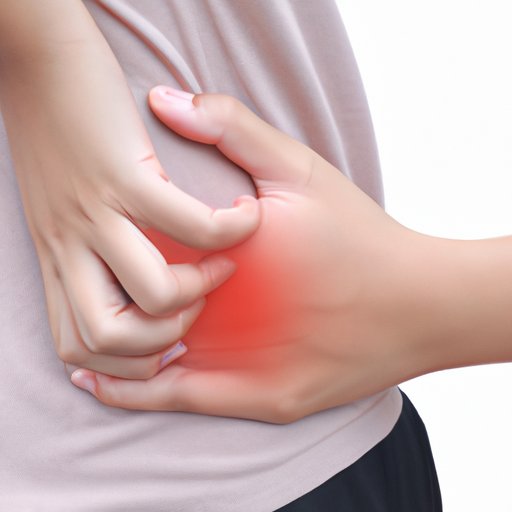
Introduction
Jock itch is a common fungal infection that affects the groin area, inner thighs, and buttocks. It causes a red, itchy rash that can be uncomfortable and embarrassing. While it is not a serious medical condition, it is important to understand the causes, symptoms, and treatment options to effectively treat and prevent jock itch.
Causes, Symptoms, and Diagnosis
Jock itch is caused by a fungal infection that thrives in warm and moist environments. It is most common in people who sweat a lot, wear tight clothing, or have a compromised immune system. Symptoms of jock itch include redness, itching, and a rash that may spread to the inner thighs and buttocks. To diagnose jock itch, a medical professional may examine the rash and take a skin sample for analysis.
How to Treat Jock Itch
While jock itch may be uncomfortable, it can be easily treated at home. The following is a step-by-step guide to treating jock itch:
Step 1: Use of Antifungal Creams
Antifungal creams such as clotrimazole and miconazole are effective in treating jock itch. These creams can be purchased over-the-counter and applied directly to the affected area twice a day for one to two weeks.
Step 2: Medications
In severe cases, oral antifungal medications may be prescribed. These medications should only be taken under the supervision of a healthcare professional, as they can have side effects and interact with other medications.
Step 3: Home Remedies
Home remedies such as tea tree oil, coconut oil, and apple cider vinegar may also be effective in treating jock itch. These remedies should be used in conjunction with antifungal creams for maximum effectiveness.
Precautions During Treatment
During treatment, it is important to take precautions to prevent the spread of jock itch. These precautions include:
1. Avoiding Certain Clothing Materials
Wear loose-fitting clothing made of breathable materials like cotton to prevent moisture buildup. Avoid synthetic materials like nylon and polyester.
2. Keeping the Infected Area Clean and Dry
Wash the affected area with soap and water and dry it thoroughly with a clean towel. Avoid sharing towels or personal items with others.
3. Avoiding Sexual Contact
Jock itch can be spread through sexual contact, so it is important to abstain from sexual activity until the infection has cleared.
Expected Duration of Treatment
Jock itch can take one to two weeks to clear up with proper treatment. It is important to continue treatment for the entire prescribed time to prevent recurrence.
Preventive Measures
To prevent jock itch from occurring or recurring, you can take the following preventive measures:
1. Hygiene Habits
Shower daily and dry the groin area thoroughly. Wear clean clothes and avoid sharing towels or personal items with others.
2. Choosing Proper Clothing
Wear loose-fitting clothing made of breathable materials like cotton. Avoid tight-fitting underwear and synthetic materials like nylon and polyester.
3. Avoiding Sharing Personal Items
Avoid sharing towels, razors, and other personal items with others to prevent the spread of jock itch.
Tips for Treating Jock Itch that Persists Despite These Measures
If jock itch persists despite these prevention and treatment measures, it is important to seek medical attention. Your healthcare provider may prescribe stronger medications or recommend alternative treatments like natural remedies and lifestyle changes.
The Importance of Seeking Medical Attention
While jock itch is not a serious medical condition, it is important to seek medical attention if symptoms persist or recur. Severe or recurring symptoms may indicate an underlying medical condition or a more serious fungal infection that may require stronger medications or alternative treatments.
A Real-Life Jock Itch Story
A man named John shares his experience with jock itch and emphasizes the importance of timely treatment. John noticed a red, itchy rash on his inner thighs and groin area. He ignored the symptoms, hoping they would go away on their own. However, the symptoms persisted, and John eventually sought medical attention. He was diagnosed with jock itch and prescribed antifungal creams. With proper treatment and preventive measures, John was able to clear up his jock itch and prevent it from recurring.
Frequently Asked Questions (FAQs)
1. How long does it take for jock itch to go away?
Jock itch can take one to two weeks to clear up with proper treatment.
2. Can jock itch go away on its own without treatment?
While jock itch may go away on its own, it is important to seek medical attention for persistent or recurring symptoms to prevent the spread of infection and ensure proper treatment.
3. How is jock itch different from other skin conditions?
Jock itch is caused by a fungal infection, while other skin conditions may have different causes such as bacterial or viral infections, allergies, or autoimmune disorders.
4. Is jock itch contagious?
Jock itch can be contagious and spread through skin-to-skin contact, sexual contact, or sharing personal items like towels and razors.
Closing Remarks
Jock itch can be uncomfortable and embarrassing, but with proper treatment and preventive measures, it can be effectively treated and prevented from recurring. Remember to seek medical attention if symptoms persist or recur, and take steps to practice good hygiene habits and choose proper clothing to prevent the spread of jock itch.





